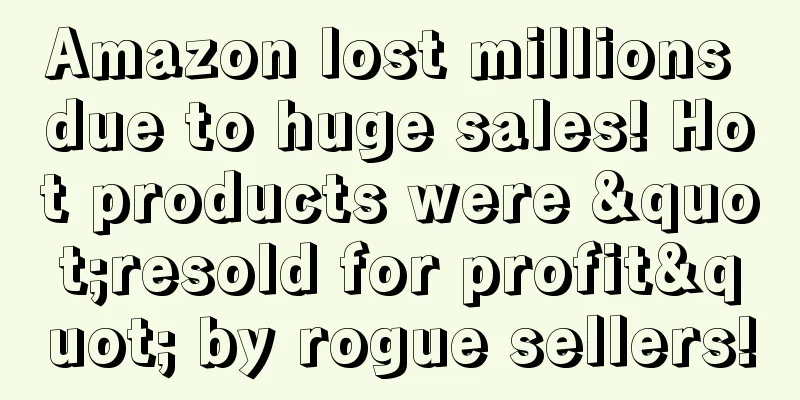|
In 2022, cross-border sellers ushered in the "brand era" of intensive cultivation .
In the face of problems such as market depression, high traffic costs, and continuous low-price competition, brand transformation has become a general trend in order to deepen the development of segmented tracks and avoid product homogeneity. But as Hugo said: It is the human heart that releases infinite light, and it is also the human heart that creates boundless darkness. Under this trend of brand transformation, even Spangler Candy, which has been a best-selling brand for hundreds of years, cannot escape the "human heart tsunami" under the intensified competition. Hot-selling products were resold at low prices, resulting in millions of losses from huge sales! It is learned that recently, Spangler Candy, a 115-year-old brand that sells candy on Amazon, discovered that its popular product DumDums lollipops were sold in large quantities by some sellers on Amazon at prices lower than the original price. Cross-border navigation , like 24 ▲ Video account focuses on cross-border navigation After placing orders at these stores, SpanglerCandy officials discovered that the products were shipped directly from Walmart Sam's Club. At Sam's Club, DumDums lollipops were sold for $15 for 500 sticks , while on Amazon, the products were sold for $26 for 400 packs . ▲ The picture comes from the Internet After investigation and research, SpanglerCandy found that this is a "resale arbitrage" model that appeared on Amazon, also known as "drop shipping" : some sellers will look for products online that are priced lower than Amazon, and then sell them on Amazon at a higher price, but in fact they have never touched the products. The specific process is as follows: - Sellers will search the internet for products with prices lower than Amazon, guided by tutorials on social platforms such as YouTube, TikTok and Instagram;
- Post the searched products on the website and wait for consumers to place orders;
- After a consumer places an order, the seller purchases the product from the retailer, ships it directly to the consumer, and pockets the difference in price.
It is understood that this arbitrage model is actually in violation of Amazon's policies, but there are still many sellers who adhere to the mentality of "rules do not hold everyone responsible" and mix in a large number of online stores to avoid supervision. As of July this year, SpanglerCandy has found at least 20 sellers reselling DumDums lollipops on Amazon. SpanglerCandy has tried to contact these sellers to ask them to remove the products, but received 75% rejection replies, which shows how lax the supervision is. According to the head of SpanglerCandy, the emergence of DumDums arbitrage sellers has caused the brand to lose millions of dollars in business and legal fees. It is learned that this "resale arbitrage" model of Amazon is not the first time it has appeared. Resale arbitrage has become a stubborn problem and the competitive environment has been destroyed! As early as the end of 2019, data from a Jungle Scout survey showed that 20% of sellers chose the business model of purchasing discounted goods from retailers and selling them to Amazon consumers (Retail Arbitrage) ; 15% of sellers chose to purchase discounted goods online and sell them to Amazon consumers (Online Arbitrage) . ▲ Picture from Jungle Scout In recent years, this phenomenon of resale arbitrage is still common on Amazon. On social platforms such as YouTube, TikTok and Instagram, related tutorials can be found everywhere, and some sellers have even regarded it as a regular operating model. Data shows that in June this year, the monthly Google search volume for "Amazon delivery" reached 22,200 times, an increase of 50% over last year. The resale arbitrage phenomenon has obviously become a stubborn problem in the market. For Amazon , this resale arbitrage model does not cause any harm to itself, and can even contribute commissions to it. Therefore, although Amazon has expressly prohibited this resale arbitrage model, the solutions it has taken are very passive. But for brand sellers, this resale arbitrage model will cause brand sellers to lose some of their active sales rights and greatly damage the competitive environment in the brand market. Therefore, in addition to Owens calling these sellers "rogue sellers", many brand sellers, while worried that these arbitrage sellers who have tasted the sweetness will extend their business to brand products in other categories, also believe that Amazon should conduct a thorough rectification and strict investigation of this phenomenon. So, before that, how should brand sellers avoid the risks and losses brought about by this arbitrage model? There are two suggestions for sellers to refer to: 1. Join Amazon’s Brand Transparency Program Amazon's Transparency Program can help sellers reduce the number of potential counterfeit products and prevent them from being copied by other merchants. It can also effectively reduce arbitrage competitors who resell similar products at low prices. 2. Use the buyer’s account to file a complaint against the arbitrage seller This arbitrage model violates Amazon's platform policy, and Amazon has always attached great importance to the needs of buyers. If you use a buyer's account to purchase the arbitrage seller's products and then file a complaint, the chances of being accepted by Amazon are higher. Currently, SpanglerCandy is preparing to join the Amazon Transparency Program , but is still worried that these sellers will find other ways to continue to arbitrage. It can be seen that Amazon still has a long way to go to eradicate the stubborn problem of low-price resale arbitrage model. What do you think about this? Welcome to discuss in the comment area~ |










